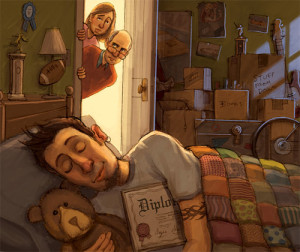Eddie has always been a really nice kid. He is easygoing and friendly. Eddie, however, is thirty years old and is not making much progress in life. His official designation is “student,” but he only completes a few courses each year and hasn’t quite decided on a major at a local community college. He works part-time at Starbucks, making just over minimum wage plus tips. Because Eddie still lives with his parents, he has enough money to keep his car running, eat out with his girlfriend, and own the latest cell phone. But last month he had to borrow money from his mother, Lois, to pay for his car insurance. She lent him the money, reasoning that if Eddie can’t drive, he can’t go to school and work. Eddie’s father, Ralph, is fed up with the situation. Why does he have to work fifty hours a week while Eddie sits around half of the time doing nothing?
Scenarios like this are being played out in thousands of homes across America. Social scientists have noticed that more young adults between eighteen and thirty years old are putting off the responsibilities of adulthood. Adultolescence is the term that best describes this postponement of adulthood into the thirties. This phase is characterized by identity exploration, instability, focus on self, feeling in limbo, and a sense of limitless possibilities. These characteristics are accompanied by transience, confusion, anxiety, obsession with self, melodrama, conflict and disappointment. Others refer to these young adults as Boomerang Kids because parents throw them out of the house, but they keep coming back. While there may be valid reasons for Boomerang Kids to live at home for a season, some are wasting time and their parents’ resources while they wander aimlessly.
Relationships between parents and their grown dependent children can be complicated. The tension experienced in many families is that young adult children want full adult privileges and freedoms without assuming adult responsibilities. They expect mom to do their laundry and cook their meals while dad works to put a roof over their heads. But if parents try to impose expectations upon them they angrily protest that they are no longer children.
The phenomenon of the Boomerang Kid occurs because parents allow it to. After all, who wouldn’t want free room and board? When we allow our young adults to flounder in self-gratification year after year, we’re not doing them any favors and may be enabling immaturity and selfishness. One goal of parenting is to train our children to live wisely on their own. 1 Corinthians 13:11 says, “When I was a child, I talked like a child, I thought like a child, I reasoned like a child. When I became a man, I put childish ways behind me.”
If you have a Boomerang Kid living at home, here are a few questions to consider from a biblical perspective:
What are valid reasons for an adult child to stay home?
A son may stay at home while he is completing his education, establishing his business, or saving for marriage (Prov. 10:4b), while a daughter may choose to stay under the protection of her parents prior to marriage (Gen. 2:24). Some young adults are not physically or mentally able to take care of themselves, and thus need their parents ongoing support. Children may stay at home in order to take care of aged or disabled parents or other family members (Ex. 20:12; Matt. 15:5-6; 1 Tim. 5:4). Sometimes children need to temporarily move home because of extraordinary circumstances such as the abandonment or death of a spouse.
What should be expected of an adult child living at home?
Expect them to take financial responsibility (2 Thes. 3:6-12). Don’t allow them to be lazy while living under your roof (Eph. 4:28; Prov. 10:1, 4-5). Demand sexual purity (Heb. 13:4). Do not tolerate substance abuse (1 Thes. 5:7; Prov. 23:20, 30-31). Hold them accountable for irresponsible behavior (Prov. 26:3). Be willing to kick them out if necessary.
What can parents do to help their Boomerang Kids grow up?
Encourage maturity (1 Cor. 4:20). Be willing to make tough choices for the good of your children. Make your expectations clear, along with the consequences. You may need to seek their forgiveness for having spoiled them. Do what you can to show you love them without compromising your standards.
Adapted from, You Never Stop Being A Parent: Thriving in Relationship with Your Adult Children, Jim Newheiser and Elyse Fitzpatrick.

